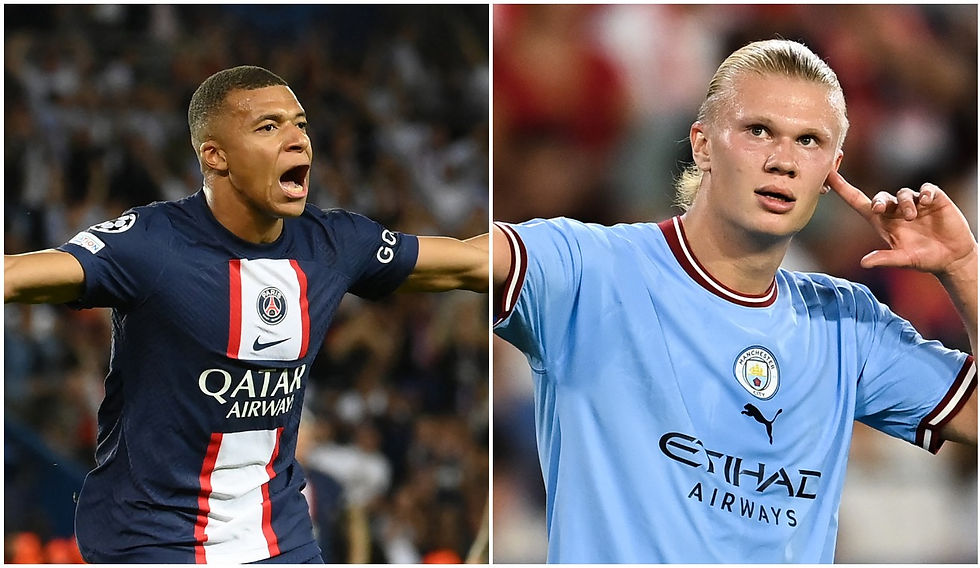Are Haaland and Mbappe the new Messi and Ronaldo?
- Kunal Gandhi
- Oct 20, 2022
- 4 min read
No sooner than the era of Ronaldo and Messi drew to a close, with their unprecedented hold on the Ballon d'Or now finally released. A new duopoly seems to have emerged, set to dominate football for years to come.

The matter that remains to be seen is whether Earling Haaland and Kylian Mbappe in practicality be the new generation’s Messi and Ronaldo. First, there are some straightforward comparisons to make, both the players are of similar ages, play similar roles, and are in comparable positions. In different ways both represent a giant European super club, thus domestic confrontation between the pair has been rare, and that would be case continued for the time being at least. They can expect to face each other semi-regularly in the champions league. As their careers to this point have demonstrated, they are both volume scorers and are both blessed with unique abilities. Mbappe is once in a generation combination of skill, speed, and goals-scoring flair, while Halaand is a highly unusual athlete who can score in any conceivable way. Both are expected to occupy the Ballon d'Or shortlist for much of the coming decade, replicating the trait of Messi and Ronaldo.
To appreciate the differences though it is worth contemplating the time before when either Messi or Ronaldo existed. An era when European football had an entirely different set of expected norms. The Ballandor is a good way of chanting those differences. To appreciate the differences though it is worth contemplating the time before the when either Messi or Ronaldo existed. An era when European football had entirely different set of expected norms. The Ballandor is a good way of chanting those differences. With CR7’s second-place finish to Kaka in 2007, it was the first time either he or Messi competed on the podium. Across the 17 previous awards only one player had won it more than once, the original Ronaldo and even his two Ballon d'Or were 5 years apart. And served to establish the point that while there were exceptions, becoming the best player in the world was outcome of perfect 12 months and the alignment of the stars. Players in European Football were always rising and falling with long periods of sustained superiority presumed to be impossible.
In the years since Messi and Ronaldo have demonstrated that to be entirely incorrect. Between the two of them, they would dominate the Ballan d’Or for the next 10 years, and not until 2018 would a different player collect the award. The nature of that superiority was distinct too, previously recognizing the best player in the world was a subjective process, world cups, league titles, and goals scored mattered, but voting was also apparently mood based. Luis Figo in 2000, Owen 2001, and Pavel Nedved in 2003 are instanced where awards were granted with medals and measurable in mind, but also with a more conceptualised idea of what made someone the best player in the world. Messi and Ronaldo have transformed that forever. One of the most compelling statistics about them is that of the list of top ten individual scoring seasons in La Liga history. Between them, they have all but seven and all the top six. Equating UCL seasons with those of the past is a flawed comparison primarily due to tournament reformatting. There too either Messi or Ronaldo or a combination of both were top scorers every season for 12 years. Haaland and Mbappe certainly have the talent to match those achievements but that is not of paramount consequence. What matters, in this instance at least, is the value of redefining what was previously thought possible, as opposed to simply matching it.
Roger Bannister was the first individual to run a 4-minute mile, few people will be able to recall who was second, despite the accomplishment being of equal worth. So, while Mbappe and Haaland could match the standards of Messi and Ronaldo. It does not seem feasible that such an act would carry a similar significance or produce an equivalent spectacle that is just the problem one. Problem two sits beyond the numbers and the statistics of the Messi-Ronaldo rivalry and within its deeper layers. The other great advantage they hold over Halaand and Mbappe and everyone who follows is that their excellence was achieved within the centrum of one of football‘s great rivalries and again conveniently at the time when Barcelona and Real Madrid were at the most acrimonious and competitive phase in their joint history. It created layers of adversity that otherwise would not have existed. For much of their careers, they were in direct opposition, on the same pitch at least twice a year and those literal contests manufactured and maintained a rivalry that otherwise would probably have been more of a media construct.
A more abstract observation might also be that during that period each of them adopted the characteristics of the teams they represented. Messi because of his size, technical qualities, and because he was indoctrinated in La Masia. Ronaldo in a more subtle way with his playing style, self-image, and orientation towards the Champions League being more in keeping with Real Madrid’s personality as a club. The debate concerning Messi and Ronaldo erupts in divisive responses and referendums as they represent different aspects of Football, both on the pitch and away from it, by a covenant quirk Mbappe and Halaand would compete for side by side for years to come, and although there is a possibility of two of them matching or surpassing the records established by Messi and Ronaldo and creating highlights that might remain in perpetuity. Nevertheless, to hope for and expect a repeat of the Messi-Ronaldo rivalry is to ignore just how rare the context of them was.







Comments